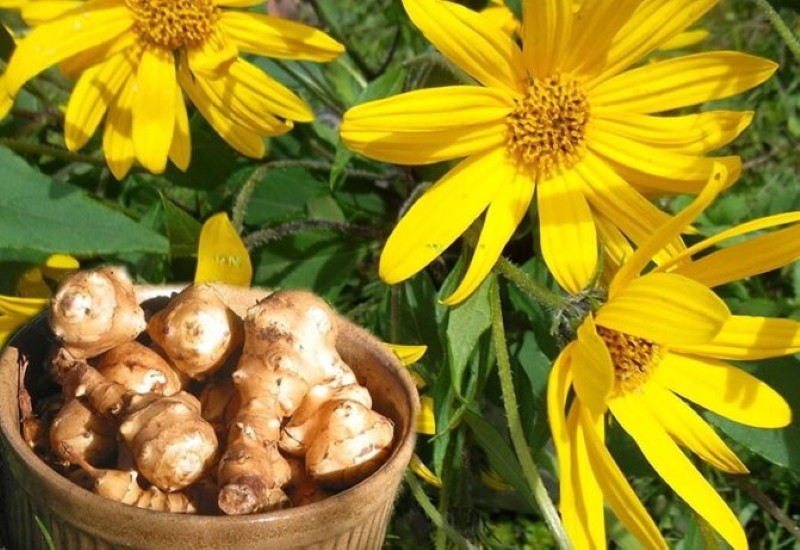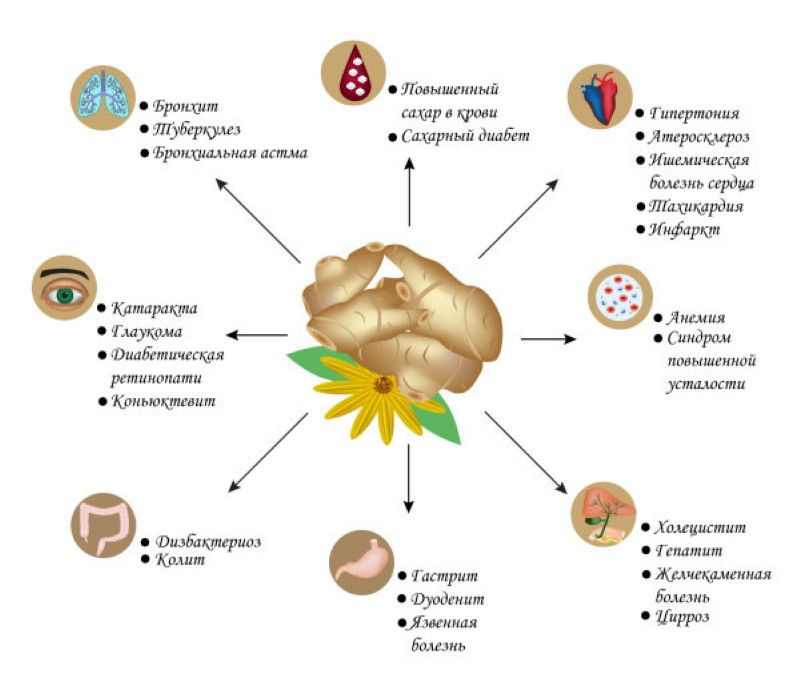Miracle root for all diseases: useful properties of Jerusalem artichoke and contraindications
 Some consider Jerusalem artichoke a weed because of its absolutely unpretentious nature and the ability to grow in any conditions, while others happily eat its fruits. However, in folk medicine, this plant is considered one of the strongest, and the beneficial properties of Jerusalem artichoke and contraindications have long been studied and used in practice. Most of the nutrients are found in the tubers. At the same time, they are low in calories, but they contain a lot of fiber, vitamins and minerals.
Some consider Jerusalem artichoke a weed because of its absolutely unpretentious nature and the ability to grow in any conditions, while others happily eat its fruits. However, in folk medicine, this plant is considered one of the strongest, and the beneficial properties of Jerusalem artichoke and contraindications have long been studied and used in practice. Most of the nutrients are found in the tubers. At the same time, they are low in calories, but they contain a lot of fiber, vitamins and minerals.
Useful properties of Jerusalem artichoke and contraindications

One of the most valuable components of the chemical composition of tubers is inulin, a polymer of fructose. Moreover, it occupies 1/5 of the total composition. It is thanks to inulin that Jerusalem artichoke can regulate carbohydrate metabolism, slowing down the absorption of carbohydrates, which is very important in diabetes. It also improves insulin resistance and helps keep glucose levels in the normal range.
100 g of fruit contains no more than 70 kcal, but there are a lot of vitamins of groups A, C, B. Of the minerals, most of all are iron, chromium, silicon, potassium, copper. Rich earthen pear and organic acids: folic, malic, succinic, fumaric, malonic. They endow the fruit with bactericidal properties.
It is interesting that wherever Jerusalem artichoke grows, it will always be useful. Root crops not only grow in any soil, but also do not accumulate harmful substances.
What happens when you use Jerusalem artichoke
 The plant tubers have an antioxidant effect and slow down the aging process. In addition, their regular use:
The plant tubers have an antioxidant effect and slow down the aging process. In addition, their regular use:
- restores potency;
- serves as a prevention of prostate adenoma;
- improves the activity of the reproductive system in women;
- strengthens the immune system, blood vessels;
- restores joints;
- increases skin elasticity;
- reduces acidity and improves the functioning of the gastrointestinal tract and pancreas;
- restores intestinal microflora;
- lowers cholesterol and blood glucose levels;
- improves the absorption of magnesium, selenium and calcium;
- activates metabolism, contributing to weight loss.
Nutritionists recommend eating no more than 150 g of earthen pear per day. This amount will be enough to get a healing effect. Exceeding these norms can cause side effects from the gastrointestinal tract: flatulence, diarrhea.
Who is not recommended to eat Jerusalem artichoke
 There are very few contraindications for root crops, and even then for the most part they are related to how Jerusalem artichoke affects the body. So, in connection with the hypotensive effect, it is worth abandoning the fetus for those who have low blood pressure. In rare cases, there may be an allergy to an earthen pear or individual components in its composition.
There are very few contraindications for root crops, and even then for the most part they are related to how Jerusalem artichoke affects the body. So, in connection with the hypotensive effect, it is worth abandoning the fetus for those who have low blood pressure. In rare cases, there may be an allergy to an earthen pear or individual components in its composition.
You also need to be careful with type 1 diabetes. Despite the very useful inulin, Jerusalem artichoke also contains sucrose with starch, which increase blood glucose. Therefore, it is necessary to use an earthen pear only against the background of adequate insulin therapy. The hope that inulin itself will cope and curb the rise in sugar is a myth. Which, by the way, is often used by unscrupulous manufacturers of dietary supplements when advertising their products.